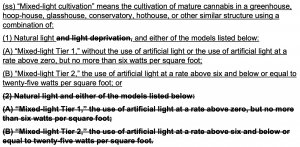Department of Cannabis Control Announces Modifications to Proposed Regulations & Brief Public Comment Period
Proposals Include Allowing Outdoor Cultivators to Use Light Deprivation; Scheduled Closures; Clarification on Use of Shipping Containers; and More

By Lauren Mendelsohn
July 7, 2022
The California Department of Cannabis Control (“DCC”) has released modifications to the proposed regulations initially published in March (which we previously discussed here, and for which we submitted a comment letter in April), and a brief public comment period is now underway until July 22. The rulemaking documents are below.
Notice of Modification to Proposed Text of Regulations (July 6, 2022)
Modified Text of Proposed Regulations (July 6, 2022) (Modifications to the proposed text of regulations are shown in either bold, double underlined or
bold, double strikethroughtype font.)
Some key proposed modifications include the following — please note this is not a comprehensive list:
- Removal of the prohibition on outdoor cultivators using light deprivation
- Clarification on usage of shipping containers
- Allowing applicants to include scheduled closures of their premises
- Clarification regarding personal cultivation on a property that is also a licensed premises
- Allowing canopy area to be used for seed production
- Clarifications regarding employee break areas
- Inclusion of delta-8 THC in definition of “total THC”
- Allowing product designated as trade samples to be redesigned for medical cannabis donation
- Clarification regarding inhalable cannabis products delivered to the lungs through a metered-dose or dry-powder inhaler
- Removal of proposed requirement that terpenes added to inhaled products be botanically derived
- Updates to the DCC’s Disciplinary Guidelines to reflect proposed modifications
Perhaps the most significant of these proposed changes is allowing outdoor cultivators to use light deprivation, as long as no artificial lighting is used. This would bring the regulatory definition of “outdoor cultivation” in line with the statutory definition in Business & Professions Code §26061, which simply says that no artificial lighting may be used.
![]()
The definition of “mixed-light cultivation” would be amended accordingly, as seen below.

This proposed amendment is exactly in line with the public comment we submitted to California regulators in 2018. Back then, we objected to the then-proposed regulations which defined light deprivation by itself (without supplemental artificial lighting) as mixed-light cultivation rather than outdoor cultivation:
The Department of Food and Agriculture does not have the power to rewrite California law; that is the purview of the Legislature. The proposed permanent regulations pertaining to “light deprivation” would in effect amend Business & Professions Code § 26061 so that “mixed- light” no longer means a combination of natural and supplemental artificial lighting, but also light deprivation without supplemental artificial lighting. In other words, the “light deprivation” regulations, as written, would be void if approved because they are inconsistent and in conflict with the statute in violation of Government Code Section 11342.2.
Our letter to the California Department of Food and Agriculture (which initially licensed and regulated cannabis cultivators) is below.
Comments to the latest set of proposed regulations can be submitted by mail or email by 5:00pm on July 22, 2022 to:
Department of Cannabis Control
Legal Affairs Division
2920 Kilgore Road
Rancho Cordova, CA 95670
E-mail: publiccomment@cannabis.ca.gov
Please contact us if you have questions about these modified proposed regulations, or if you would like help writing or submitting a comment to be included in the rulemaking record.
This is a public educational service and is not intended, nor should be construed, as legal advice. For specific questions about California’s current and proposed cannabis laws and regulations, contact the Law Offices of Omar Figueroa at 707-829-0215 or info@omarfigueroa.com to schedule a confidential legal consultation.
Omar Figueroa is the attorney responsible for this advertisement. Prior results do not guarantee a similar outcome.
